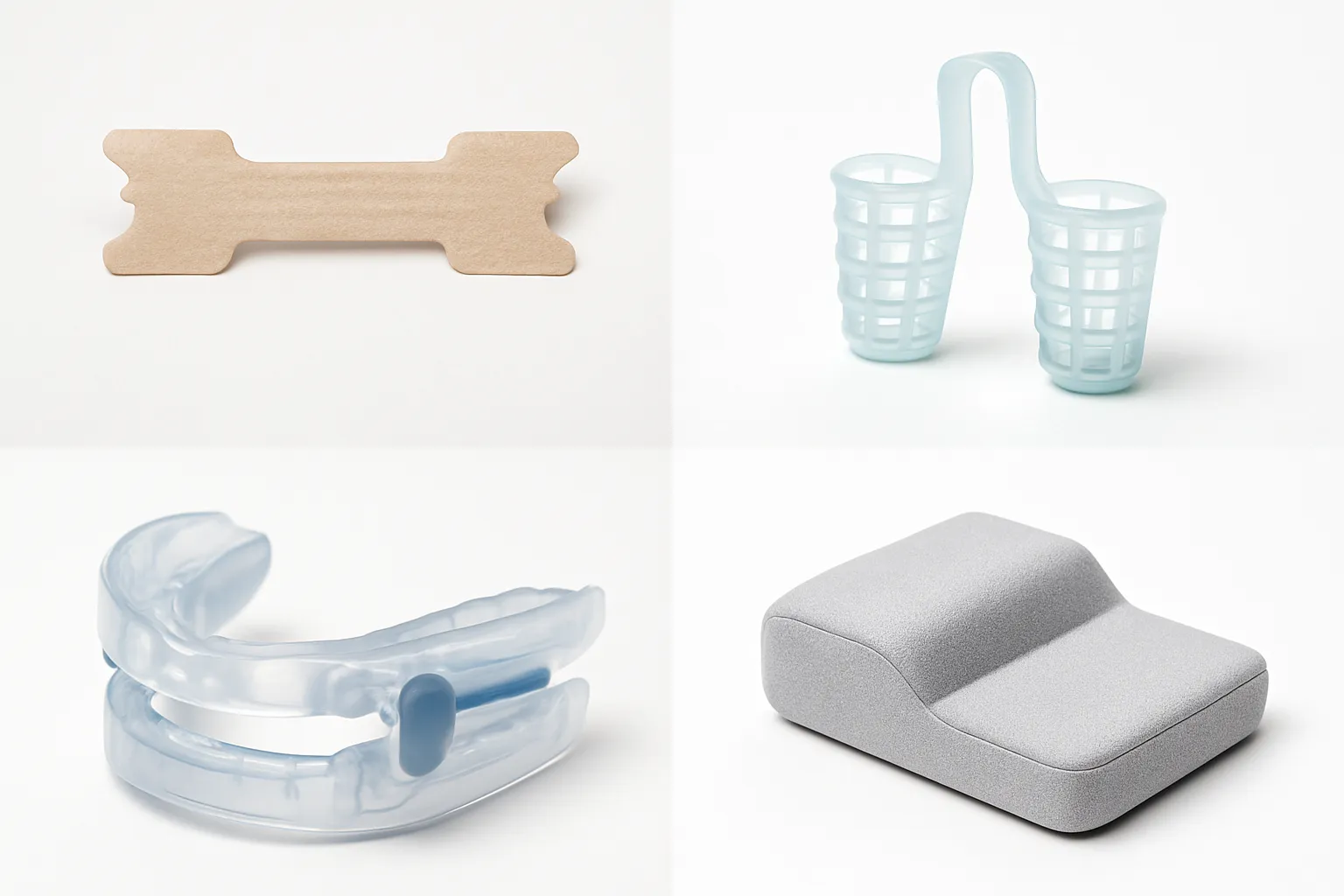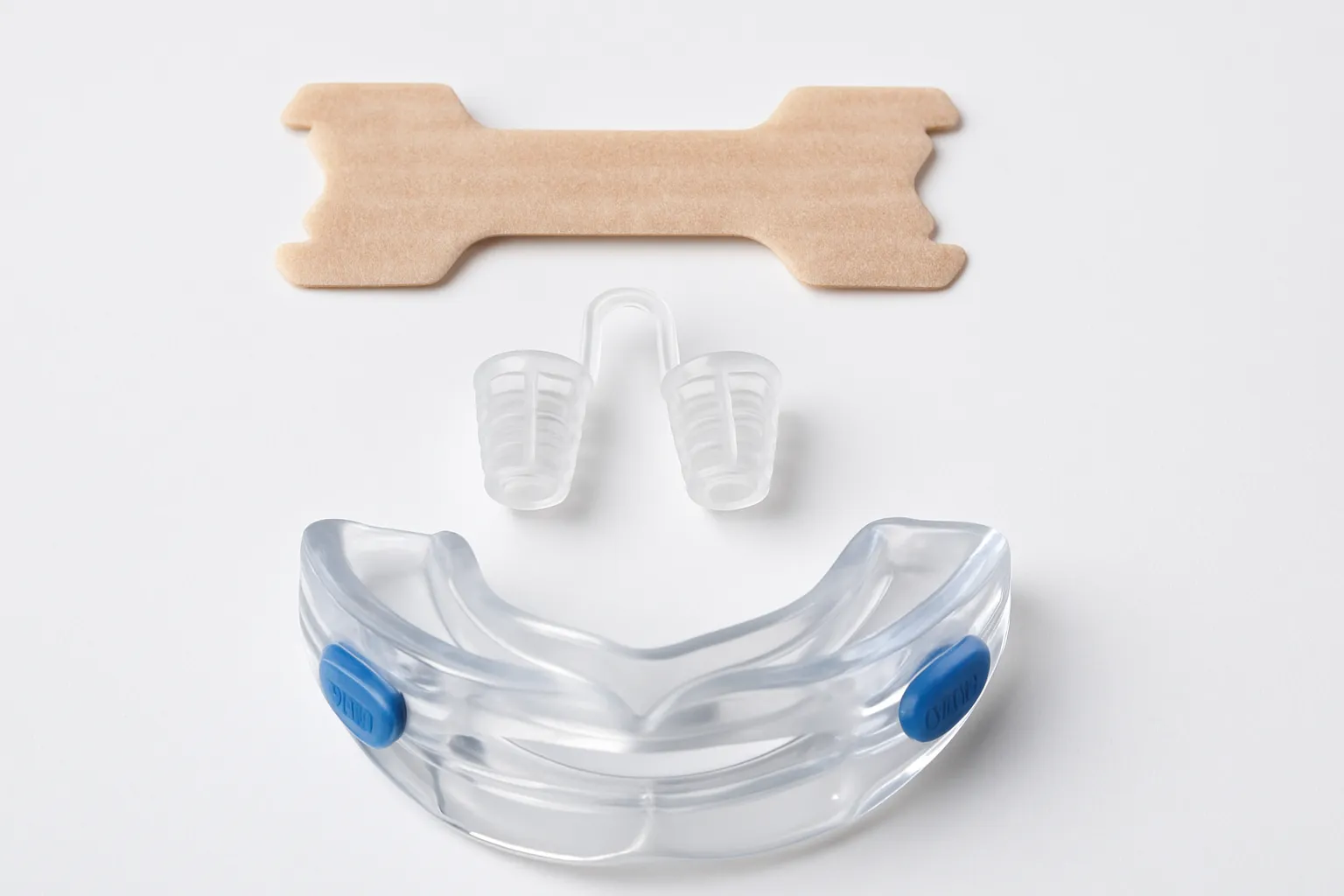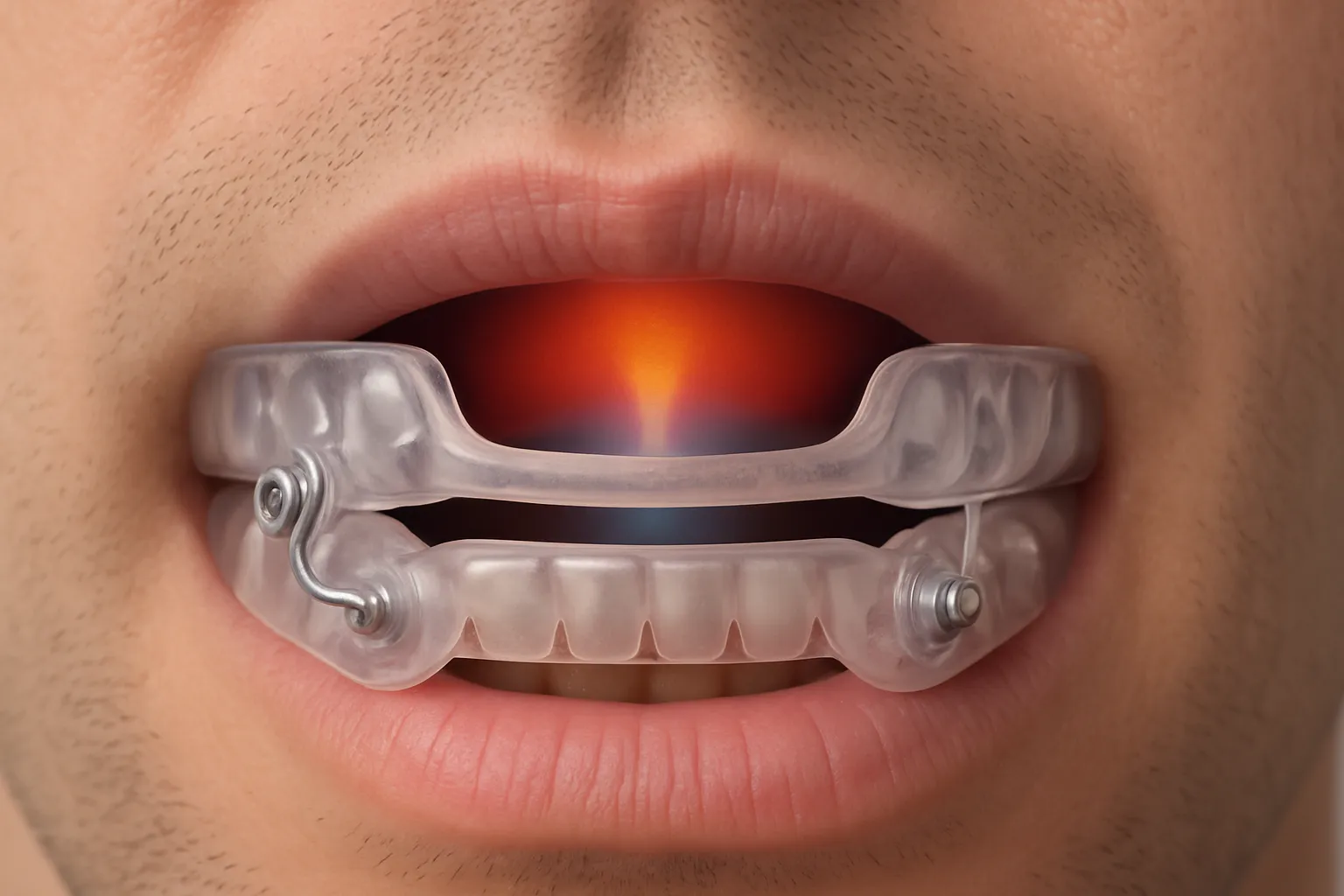Are Anti-Snoring Sprays Effective? A Deep Dive into Snoring Solutions
Published by Dr. Emily Thompson | Sleep Medicine and Otolaryngology Specialist
 Anti-snoring devices overview
Anti-snoring devices overview
Anti-snoring sprays have become increasingly popular as a quick, non-invasive solution for snoring problems. Marketed as easy-to-use, fast-acting remedies, these products promise to reduce or eliminate snoring with just a few sprays before bedtime. But do they actually work? This comprehensive analysis examines the science behind anti-snoring sprays, their effectiveness, limitations, and how they compare to other snoring solutions.
Understanding Anti-Snoring Sprays
What Are Anti-Snoring Sprays?
Product Composition:
- Active ingredients: Essential oils, lubricants, anti-inflammatory agents
- Delivery method: Nasal sprays, throat sprays, or oral mists
- Application timing: Applied 15-30 minutes before bedtime
- Duration of action: Typically 4-8 hours of effectiveness
Common Ingredients:
- Essential oils: Peppermint, eucalyptus, lavender, tea tree oil
- Lubricants: Glycerin, propylene glycol, natural oils
- Anti-inflammatory agents: Aloe vera, chamomile extracts
- Moisturizers: Hyaluronic acid, vitamin E, natural emollients
Mechanism of Action:
- Lubrication: Coats throat tissues to reduce vibration
- Anti-inflammatory: Reduces tissue swelling and irritation
- Moisturization: Prevents dryness that can worsen snoring
- Muscle relaxation: Some ingredients may relax throat muscles
 Anti-snoring devices oral appliances
Anti-snoring devices oral appliances
Types of Anti-Snoring Sprays
Nasal Sprays:
- Application: Sprayed into nostrils before sleep
- Target area: Nasal passages and sinuses
- Benefits: Addresses nasal congestion and obstruction
- Limitations: May not help with throat-based snoring
Throat Sprays:
- Application: Sprayed directly into throat
- Target area: Soft palate, uvula, and throat tissues
- Benefits: Direct application to snoring source
- Limitations: May cause throat irritation or taste issues
Oral Mists:
- Application: Sprayed into mouth and throat
- Target area: Entire oral cavity and upper airway
- Benefits: Comprehensive coverage of snoring areas
- Limitations: May affect taste and swallowing
Scientific Evidence and Effectiveness
Research Studies on Anti-Snoring Sprays
Clinical Trials:
- Limited research: Few high-quality studies on spray effectiveness
- Small sample sizes: Most studies involve fewer than 100 participants
- Short duration: Studies typically last 1-4 weeks
- Subjective measures: Often rely on self-reported improvement
Effectiveness Data:
- Overall success rate: 30-60% of users report improvement
- Severity reduction: Mild to moderate snoring shows best results
- Duration of effect: Benefits typically last 4-6 hours
- Consistency: Results vary significantly between individuals
Placebo Effect:
- Psychological factors: Belief in treatment can improve outcomes
- Sleep quality: Better sleep hygiene often accompanies treatment
- Expectation bias: Users may overestimate improvement
- Natural variation: Snoring severity naturally fluctuates
Limitations of Current Research
Methodological Issues:
- Lack of controls: Many studies lack proper placebo groups
- Measurement problems: Difficulty in objectively measuring snoring
- Confounding factors: Other treatments or lifestyle changes
- Publication bias: Positive results more likely to be published
Individual Variability:
- Different causes: Snoring has multiple underlying causes
- Anatomical differences: Throat and airway structures vary
- Response patterns: Some people respond better than others
- Tolerance development: Effectiveness may decrease over time
When Anti-Snoring Sprays May Work
Ideal Candidates for Spray Treatment
Mild Snoring:
- Occasional snoring: Not every night
- Low intensity: Quiet to moderate snoring sounds
- No sleep apnea: Absence of breathing pauses
- Good health: No underlying medical conditions
Specific Causes:
- Nasal congestion: Allergies, colds, sinus issues
- Dry throat: Dehydration, mouth breathing
- Mild inflammation: Throat irritation or swelling
- Positional snoring: Only when sleeping on back
Lifestyle Factors:
- Good sleep hygiene: Regular sleep schedule
- Healthy weight: No obesity-related airway narrowing
- No alcohol: Avoided alcohol before bedtime
- Proper hydration: Adequate water intake
Situations Where Sprays May Help
Temporary Relief:
- Travel snoring: Changes in environment or routine
- Seasonal allergies: Pollen or environmental triggers
- Mild colds: Temporary nasal congestion
- Stress-related: Temporary throat tension
Complementary Treatment:
- With other methods: Combined with positional therapy
- Lifestyle changes: Along with weight loss or exercise
- Medical treatment: As adjunct to professional care
- Prevention: Before snoring becomes severe
Limitations and Drawbacks
Why Sprays Don't Work for Everyone
Severe Snoring:
- Structural issues: Large tonsils, deviated septum
- Sleep apnea: Complete airway obstruction
- Obesity: Excess fat around neck and throat
- Anatomical problems: Small jaw, large tongue
Chronic Conditions:
- Allergic rhinitis: Persistent nasal inflammation
- Chronic sinusitis: Long-term sinus problems
- Gastroesophageal reflux: Acid irritation of throat
- Neuromuscular disorders: Weak throat muscles
Lifestyle Factors:
- Alcohol consumption: Relaxes throat muscles
- Sedative medications: Increase muscle relaxation
- Poor sleep position: Sleeping on back
- Irregular sleep schedule: Disrupts natural rhythms
Potential Side Effects
Local Irritation:
- Throat discomfort: Burning or stinging sensation
- Nasal irritation: Dryness or burning in nose
- Taste changes: Altered taste perception
- Swallowing difficulty: Temporary throat tightness
Allergic Reactions:
- Skin sensitivity: Rash or irritation around mouth
- Respiratory symptoms: Wheezing or difficulty breathing
- Eye irritation: Watery or itchy eyes
- Systemic reactions: Rare but serious allergic responses
Dependency Issues:
- Tolerance development: Reduced effectiveness over time
- Psychological dependence: Belief that spray is necessary
- Masking symptoms: Hiding underlying problems
- Delayed treatment: Postponing professional evaluation
Comparing Anti-Snoring Sprays to Other Solutions
Effectiveness Comparison
vs. Positional Therapy:
- Spray effectiveness: 30-60% improvement
- Positional therapy: 50-80% improvement
- Cost comparison: Sprays more expensive long-term
- Ease of use: Sprays easier, positional therapy requires commitment
vs. Oral Appliances:
- Spray effectiveness: 30-60% improvement
- Oral appliances: 60-90% improvement
- Durability: Sprays temporary, appliances long-lasting
- Professional fitting: Sprays over-the-counter, appliances require fitting
vs. CPAP Therapy:
- Spray effectiveness: 30-60% improvement
- CPAP therapy: 90-95% improvement
- Severity addressed: Sprays for mild, CPAP for moderate-severe
- Medical supervision: Sprays self-administered, CPAP requires prescription
 Oral appliance for snoring
Oral appliance for snoring
Cost-Benefit Analysis
Short-term Costs:
- Spray products: $15-50 per bottle
- Duration: 1-3 months per bottle
- Annual cost: $60-200 per year
- Immediate availability: Over-the-counter purchase
Long-term Considerations:
- Cumulative cost: Higher than one-time purchases
- Effectiveness decline: May need stronger products over time
- Alternative costs: Professional evaluation and treatment
- Health costs: Untreated underlying conditions
How to Use Anti-Snoring Sprays Effectively
Proper Application Techniques
Timing:
- Application time: 15-30 minutes before bedtime
- Consistency: Use every night for best results
- Duration: Continue for at least 2-4 weeks
- Evaluation: Assess effectiveness after trial period
Application Method:
- Nasal sprays: Tilt head back, spray into each nostril
- Throat sprays: Open mouth wide, spray toward back of throat
- Oral mists: Spray into mouth, swish briefly, then swallow
- Avoidance: Don't eat or drink for 15 minutes after application
Dosage Guidelines:
- Follow instructions: Use recommended number of sprays
- Don't overuse: More isn't necessarily better
- Adjust as needed: Modify based on effectiveness
- Consult professional: If no improvement after 4 weeks
Maximizing Effectiveness
Combine with Other Methods:
- Sleep position: Sleep on side, not back
- Lifestyle changes: Weight loss, exercise, alcohol reduction
- Sleep hygiene: Regular schedule, cool bedroom, no electronics
- Nasal care: Saline rinses, allergy management
Monitor Results:
- Sleep diary: Record snoring frequency and intensity
- Partner feedback: Ask bed partner about improvement
- Sleep quality: Note changes in sleep satisfaction
- Side effects: Track any adverse reactions
When to Stop:
- No improvement: After 4 weeks of consistent use
- Side effects: If irritation or discomfort persists
- Worsening symptoms: If snoring becomes more severe
- Medical advice: Consult healthcare provider
Alternative Solutions When Sprays Don't Work
Non-Invasive Alternatives
Positional Therapy:
- Side sleeping: Most effective position for reducing snoring
- Specialized pillows: Position-maintaining devices
- Tennis ball method: Simple DIY positional therapy
- Effectiveness: 50-80% improvement for position-dependent snoring
Lifestyle Modifications:
- Weight management: 10% weight loss can reduce snoring by 30-50%
- Exercise: Strengthens throat muscles and improves sleep quality
- Alcohol avoidance: Eliminate alcohol 3+ hours before bedtime
- Sleep hygiene: Optimize sleep environment and schedule
Nasal Treatments:
- Saline rinses: Clear nasal passages and reduce congestion
- Nasal strips: Open nasal passages for better airflow
- Allergy management: Control allergic reactions that cause congestion
- Humidification: Maintain proper humidity in bedroom
Professional Treatment Options
Oral Appliances:
- Mandibular advancement devices: Reposition jaw to open airway
- Tongue retaining devices: Keep tongue in forward position
- Custom fitting: Professional fitting for optimal results
- Effectiveness: 60-90% improvement for mild to moderate snoring
Medical Evaluation:
- Sleep study: Diagnose underlying sleep disorders
- ENT consultation: Evaluate anatomical causes of snoring
- Allergy testing: Identify environmental triggers
- Imaging studies: CT scans or MRIs for structural issues
Surgical Options:
- Uvulopalatopharyngoplasty: Remove excess throat tissue
- Tonsillectomy: Remove enlarged tonsils
- Septoplasty: Correct deviated nasal septum
- Radiofrequency ablation: Minimally invasive tissue reduction
Making an Informed Decision
When to Try Anti-Snoring Sprays
Appropriate Situations:
- Mild, occasional snoring: Not severe or every night
- Nasal congestion: Allergies, colds, or sinus issues
- Temporary relief: Travel, stress, or environmental changes
- Complementary treatment: Along with other methods
Realistic Expectations:
- Moderate improvement: 30-60% reduction in snoring
- Temporary effect: Benefits may not be permanent
- Individual variation: Results vary between people
- Combination approach: Works best with other treatments
When to Seek Professional Help
Red Flags:
- Severe snoring: Very loud or disruptive
- Breathing pauses: Observed by bed partner
- Daytime sleepiness: Excessive fatigue or drowsiness
- Morning headaches: Regular headaches upon waking
Persistent Problems:
- No improvement: After 4 weeks of spray use
- Worsening symptoms: Snoring becomes more severe
- New symptoms: Chest pain, irregular heartbeat
- Quality of life: Significant impact on daily functioning
Underlying Conditions:
- Sleep apnea: Suspected breathing disorders
- Medical conditions: Heart disease, diabetes, hypertension
- Medications: Side effects from prescription drugs
- Anatomical issues: Structural problems in airway
Conclusion
Anti-snoring sprays can provide temporary relief for mild snoring, particularly when caused by nasal congestion, dry throat, or temporary inflammation. However, their effectiveness is limited and varies significantly between individuals. While they may offer a convenient, non-invasive option for some people, they should not be considered a comprehensive solution for chronic or severe snoring problems.
The key to successful snoring management is understanding the underlying cause and implementing appropriate treatment strategies. For many people, a combination of lifestyle modifications, positional therapy, and professional evaluation provides the best long-term results.
If you're considering anti-snoring sprays, start with realistic expectations and be prepared to explore other options if they don't provide adequate relief. Remember that persistent snoring can be a sign of underlying health issues that require professional medical attention.
Key Takeaways
- Anti-snoring sprays provide 30-60% improvement for mild snoring
- Effectiveness varies significantly between individuals and snoring causes
- Sprays work best for temporary issues like nasal congestion or dry throat
- They should be used as part of a comprehensive snoring management plan
- Professional evaluation is recommended for persistent or severe snoring
- Alternative treatments like positional therapy and lifestyle changes may be more effective
- Cost-benefit analysis shows sprays may be expensive long-term
- Safety and side effects should be considered before use
References
- American Academy of Sleep Medicine. (2014). International Classification of Sleep Disorders, 3rd Edition.
- National Sleep Foundation. (2020). Sleep in America Poll: Snoring and Sleep Quality.
- Sleep Foundation. (2021). Anti-Snoring Sprays: Do They Work?
- Mayo Clinic. (2021). Snoring: Diagnosis and Treatment.
- Harvard Health Publishing. (2020). Snoring: Causes and Solutions.
Related Articles
- Light Snoring vs. Sleep Apnea: Why It Matters More Than You Think
- How Alcohol and Late-Night Eating Affect Sleep Quality and Snoring
- When Snoring Gets Dangerous: Early Warning Signs of Sleep Apnea
